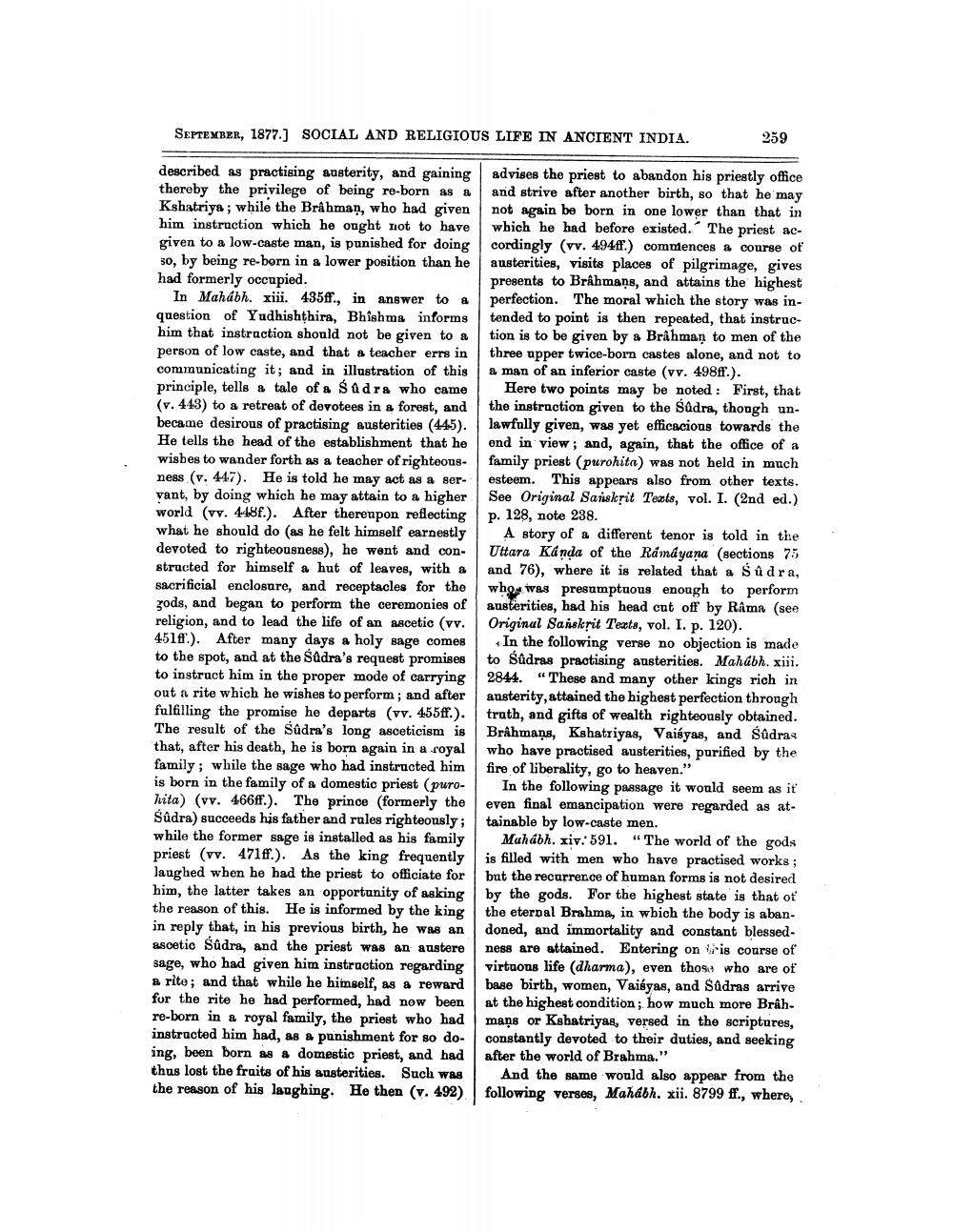________________
SEPTEMBER, 1877.] SOCIAL AND RELIGIOUS LIFE IN ANCIENT INDIA.
259
described as practising austerity, and gaining advises the priest to abandon his priestly office thereby the privilege of being re-born as a and strive after another birth, so that he may Kshatriya ; while the Brâhman, who had given not again be born in one lower than that in him instruction which he ought not to have which he had before existed. The priest acgiven to a low-caste man, is punished for doing cordingly (vv. 494ff.) commences a course of so, by being re-born in a lower position than he austerities, visits places of pilgrimage, gives had formerly occupied.
presents to Brahmans, and attains the highest In Mahábh. xiii. 435ff., in answer to a perfection. The moral which the story was inquestion of Yudhishthira, Bhishma informs tended to point is then repeated, that instruchim that instraction should not be given to a tion is to be given by a Brahman to men of the person of low caste, and that a teacher errs in three upper twice-born castes alone, and not to communicating it; and in illustration of this & man of an inferior caste (vv. 4984.). principle, tells a tale of a sudra who came Here two points may be noted : First, that (v. 443) to a retreat of devotees in a forest, and the instruction given to the Sadra, thongh unbecame desirous of practising austerities (445). lawfully given, was yet efficacious towards the He tells the head of the establishment that he end in view ; and, again, that the office of a wishes to wander forth as a teacher of righteous. family priest (purohita) was not held in much ness (v. 447). He is told he may act as a ser esteem. This appears also from other texts. vant, by doing which he may attain to a higher See Original Sanskrit Texts, vol. I. (2nd ed.) world (vv. 4-48f.). After thereupon reflecting p. 128, note 238. what he should do (as he felt himself earnestly A story of a different tenor is told in the devoted to righteousness), he went and con- Uttara Kanda of the Ramayana (sections 75 structed for himself a hut of leaves, with a and 76), where it is related that a Sudra, sacrificial enclosure, and receptacles for the who was presumptuous enough to perform gods, and began to perform the ceremonies of austerities, had his head cut off by Rama (see religion, and to lead the life of an ascetic (vv. Original Sanskrit Texts, vol. I. p. 120). 451f1.). After many days a holy sage comes In the following verse no objection is made to the spot, and at the Sadra's request promises to Sudras practising austerities. Mahabh. xiii. to instruct him in the proper mode of carrying 2844. "These and many other kings rich in out a rite which he wishes to perform ; and after austerity, attained the highest perfection through fulfilling the promise he departs (vv. 455ff.). truth, and gifts of wealth righteously obtained. The result of the Sûdras long asceticism is Brahmans, Kshatriyas, Vaisyas, and Sudras that, after his death, he is born again in a coyal who have practised austerities, purified by the family; while the sage who had instructed him fire of liberality, go to heaven." is born in the family of a domestic priest (puro- In the following passage it would seem as it Wita) (vv. 466ff.). The prince (formerly the even final emancipation were regarded as atSudra) succeeds his father and rules righteously; tainable by low-caste men. while the former sage is installed as his family Muhábh. xiv. 591. "The world of the gods priest (vv. 471ff.). As the king frequently is filled with men who have practised works ; laughed when he had the priest to officiate for but the recurrence of human forms is not desired him, the latter takes an opportunity of asking by the gods. For the highest state is that of the reason of this. He is informed by the king the eternal Brahma, in which the body is abanin reply that, in his previous birth, he was an doned, and immortality and constant blessed ascetic Sûdra, and the priest was an austereness are attained. Entering on Wis course of sage, who had given him instruction regarding virtuous life (dharma), even those who are of a rite; and that while he himself, as a reward base birth, women, Vaisyas, and Südras arrive for the rite he had performed, had now been at the highest condition; how much more Brahre-born in a royal family, the priest who had mans or Kshatriyas, versed in the scriptures, instructed him had, as a punishment for so do- constantly devoted to their duties, and seeking ing, been born as & domestic priest, and had after the world of Brahma." thus lost the fruits of his austerities. Such was And the same would also appear from the the reason of his langhing. He then (v. 492) following verses, Mahabh. xii. 8799 ff., where,




